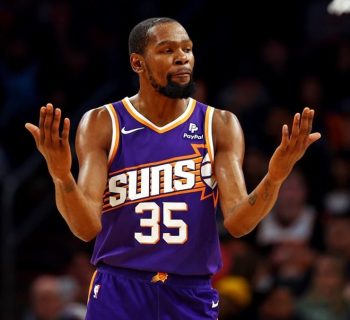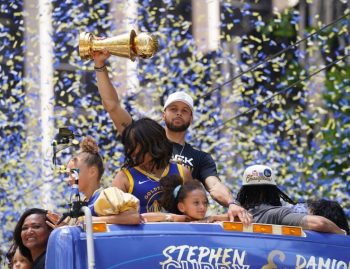NBA
NBA Sunday: Coach of the Year Candidates

With the amazing feats of Russell Westbrook and James Harden, Kawhi Leonard’s emergence as perhaps the best two-way player in the league and LeBron James as the only other person that could challenge him for that title, the competition for the 2017 Most Valuable Player Award is a four-horse race.
Legitimate arguments can be made for each of the four, with Harden and Westbrook likely ending up first and second, in some order.
Traditionally, the Coach of the Year Award has been much more difficult to predict. But this season, with NBA teams having less than 15 games remaining, a few names probably deserve more mention than others.
THE HONORABLE MENTIONS
Gregg Popovich, San Antonio Spurs
First, the most honorable of mentions should go to Gregg Popovich. Not ranking in the top five, he is mainly a victim of circumstance. Entering play on March 19, the Spurs are on pace to win 62 games and have been the second-best team in the league for pretty much the entire season. This is a monumental accomplishment for the franchise, especially in the wake of Tim Duncan’s departure. Although Duncan’s minutes and usage rates have been diminishing over the past few years, he was a leader for the franchise and the loss of his presence, in most situations, could have had far-sweeping ramifications on the psyche of Popovich’s personnel.
Typically, we thrash head coaches when their teams and personnel don’t live up to expectations, but rarely credit the head coach when one of his young players fulfills their potential. If you ask Kawhi Leonard himself, he will tell you that Popovich is a major reason for his blossoming into a true superstar. Like LeBron James, Popovich could legitimately win the award every season. Fortunately, he has already won the award three times and joins only Pat Riley and Don Nelson as three-time winners.
Despite the lack of consideration he’ll get this season, Popovich is something much more meaningful than the Coach of the Year—he’s the coach of the decade.
Scott Brooks, Washington Wizards
Often, head coaches aren’t given any credit for their success if the perception is that they have talented players at their disposal. People openly question whether Phil Jackson was some sort of coaching genius because, some say, he had Michael and Scottie and Kobe and Shaq.
The same was said for Brooks, who enjoyed success with Russell Westbrook and Kevin Durant. At least for the time being, Brooks has silenced those critics. In D.C., he inherited a situation where his two star players were on record as not necessarily being on the same page. The team was a perennial underachiever that was perceived to have had young pieces that may not amount to much. Since beginning the season 2-8, Brooks has led the Wizards to a 40-19 record. He has adjusted the pace and space of his offense to simultaneously utilize John Wall’s strengths and allow Bradley Beal and Otto Porter to find their spots on offense. As a result, the team enters play on March 19 with a 42-27 record and is on pace to win 50 games for the first time since the 1978-79 season.
In his first season as the head coach of the Wizards, leading this young team toward the top was no easy task. The man deserves kudos.
Mike Malone, Denver Nuggets
After spending 10 years as an assistant coach, Mike Malone finally got an opportunity to serve as a head coach when he was hired by the Sacramento Kings in 2013. He lasted just 106 games and, after compiling a 39-67 record, was fired about a quarter of the way through his second season.
Immediately hired by the Nuggets after the franchise fired Brian Shaw, Malone put together a 33-49 season during 2015-16 and wasn’t necessarily regarded as an asset.
With the Nuggets entering play on March 19 at 33-36, however, the team has already matched last season’s win total and currently holds the eighth and final playoff seed in the Western Conference. With the Portland Trail Blazers nipping at their heels (they trail the Nuggets by just 1.5 games), Malone and his squad will have to keep pace.
Earlier this season, Will Barton and Mike Miller spoke with Basketball Insiders about Malone’s approach, and each had positive things to say. Nikola Jokic has proven to be a special player while Danilo Gallinari has regained his past form. What has seemed to have made a major difference for the Nuggets, however, is Malone’s opting to take minutes away from Kenneth Faried and Emmanuel Mudiay. With each player being young and promising, diminishing their roles was a difficult and risky decision that has obviously paid dividends.
If the Nuggets qualify for the playoffs for the first time since the departure of George Karl, Malone would have done something incredibly improbable.
THE CONTENDERS
Mike D’Antoni, Houston Rockets
Although one could argue that with a superstar talent like James Harden, Mike D’Antoni deserves less credit for what the Rockets have accomplished than, say, a coach that has done more with less, consider this: a head coach gets paid to figure out how to make it all work.
In Portland, New York and Charlotte, there is a lot of talent. That these teams have each underachieved this season underscores the point. D’Antoni deserves credit for shifting James Harden to be the team’s primary ball handler and orchestrator, as well as making sure that he has found time for his plus-defenders to play. With Trevor Ariza, Patrick Beverly and Clint Capela, the Rockets rank a respectable 17th in the league in defensive efficiency. While still being in the bottom half of the league, that placing may be good enough for the Rockets to make some noise in the playoffs, considering the fact that they rank first in offensive efficiency.
Obviously, the Rockets lost Dwight Howard and received no compensation in return, but they also saw other rotation players depart—Terrence Jones, Donatas Montiejunas, Josh Smith and Jason Terry among them.
In other words, D’Antoni had to reach James Harden, implement his system and incorporate new pieces. Had the Rockets won 45 games and made the playoffs, it would have probably been considered a successful season. Instead, they have improbably secured the third seed in the conference and will probably reach the second round of the playoffs, at least.
Quin Snyder, Utah Jazz
This season, the Western Conference was supposed to be controlled by the Golden State Warriors, the San Antonio Spurs and the Los Angeles Clippers. Every other team was thought to be a rung below.
Apparently, the Utah Jazz never got that memo.
In short, behind the brilliance of Quin Snyder, the Jazz have finally put all of their pieces together. Gordon Hayward has become an All-Star, Rudy Gobert is regarded as one of the league’s top defenders and Rodney Hood is one of the league’s most underrated shooting guards.
What’s most impressive about the job that Snyder has done this season, though, has been how he’s managed his rotations. Despite missing Hood, George Hill, Derrick Favors and Alec Burks for extended time this season, he has managed to apportion his rotation minutes adequately. He has held his young players to high standards and, despite only being a head coach for only three seasons, knows a thing or two about motivation.
That he has been able to develop his young team while integrating Boris Diaw and Joe Johnson has left little to be desired. What puts him over the top in terms of consideration is his team being on pace to win 50 games for the first time since Jerry Sloan was patrolling the sidelines. In a season where many predicted the Oklahoma City Thunder and Portland Trail Blazers to be the bosses of the Northwest Division, Synder clearly had other plans.
Erik Spoelstra, Miami HEAT
Despite leading the Miami HEAT to two championships and four NBA Finals appearances, Erik Spoelstra has never been one to receive the credit he’s deserved. Again, with LeBron James, Dwyane Wade and Chris Bosh together, the expectations for the ball club were through the roof. Anything less than 70 wins wouldn’t have garnered much attention for Spoelstra, and the haters would spend more time questioning how the HEAT lost the 2011 NBA Finals to the Dallas Mavericks despite leading the series 2-1.
Last season, though, with James having taken his talents back to Cleveland in 2014 and Bosh sidelined, the HEAT managed to win 48 games and came within one game of reaching the Eastern Conference Finals.
With Wade unexpectedly departing for Chicago, entering the season, nobody in their right mind thought that the HEAT would have an opportunity to qualify for the playoffs. Yet, Spoelstra has seven players on his team averaging 10 or more points per game and has improbably found a way to make the triumvirate of Hassan Whiteside, Goran Dragic and Dion Waiters work.
A short while ago, the HEAT were 11-30. Since then, they had a 12-game winning streak and have gone 23-5. They enter play on March 19 at 34-35 and with control of the seventh seed in the Eastern Conference.
Spoelstra has long been a head coach who has made the most with the least. This season, though, it’s impossible to not notice.
In a season where nobody expected anything from the HEAT, Spoelstra expected everything, as usual. He has pulled every imaginable ounce of potential from his team and, in a season where tanking could have revealed a pot of gold at the end of the rainbow, the HEAT opted not to cheat their fans.
That absolutely counts for something.
* * * * * *
Similar to the Most Valuable Player Award, there is no clear criteria for what it takes to be named the Coach of the Year. What is true is that a coach’s chances of winning the award increases along with his team’s win total. Since the turn of the century, only one time has the recipient coached a team to less than 50 wins (Sam Mitchell won the award in 2007 after leading the Toronto Raptors to 47 wins). During that same timeframe, the winning coach led his team to at least 60 wins on eight occasions.
Odds are, this season, those familiar trends will be bucked.













